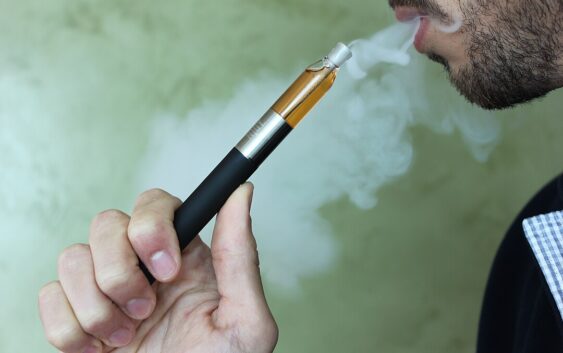In a Dance with Dopamine

Gianna Blasco ’27
blascogis00@lakeforest.edu
JOUR 320 student
Colin Thornock, a Lake Forest College sophomore, takes a puff of a “Miami Mint Geek Bar” with 22% battery and 0% vape juice left.. He exhales a mysterious mixture of formaldehyde and heavy metals, masked in a minty fresh scent.
“I think the idea of selling someone an addiction is something that the devil couldn’t have thought of himself. It’s the darkest evil, and [tobacco manufacturers] are slowly killing us all,” said Thornock. “They’re killing us, getting children addicted to drugs. They don’t care. They care about the profits. I don’t know how we will beat it without a ban.”
Earlier this month [April 2025], the U.S. Supreme Court backed the federal Food and Drug Administration’s ban on flavored vaping products. But e-cigarette and tobacco companies continue to seduce millions of young people, with flavorings, candy-style names, and electronic features like lights and games that have been shown to make tobacco products more appealing.
On the Lake Forest College campus, I have observed that it can be as common for a student to be carrying a water bottle as some form of nicotine. ZYN nicotine pouches, cigarettes, vapes—the range of nicotine consumption underscores the addictive nature of the drug, according to Dr. Hannah Carlson, an assistant professor of psychology and neuroscience.
“Nicotine is one of the most addictive substances in the world,” said Carlson, who received her PhD at Wake Forest School of Medicine and focused her studies on substance use and addiction in a city that is home to R. J. Reynolds, one of the largest tobacco companies in the country. “When you take a puff of a cigarette or vape, you get a very immediate dopamine response.”
Dopamine, the “feel-good chemical” in our brains, has what is called a reinforcing effect, she added. Carlson says that dopamine responds not only to reward, but also to certain cues and the anticipation of feeling good.
If our brain is hard-wired to keep us alive, it makes sense for our brains to crave dopamine. The activities that people experience as feeling good, such as eating, exercising, social interaction or having sex, for instance, are also necessary for survival.
However, this dance with dopamine is dangerous when drugs enter our system. Drugs “hijack” the system through which dopamine operates on our brains, said Carlson. Over time, your brain gets used to it and needs more.
“Drugs, although we don’t need them, are sort of tricking our brains into believing that they are something that is related to survival, and you need them to stay alive, and you can’t go without them,” she said. “[For] your brain right, it’s like well, this thing is producing the most dopamine, it must be really important, it must be helping me stay alive, it must be really important, that’s what I should pay attention to.”
Individuals begin using it for fun, and then they use it because it feels good and can’t stop chasing the buzz, even when it loses impact. If I don’t have my own vape, I can always find a friend at the college with a vape when I need it, says one Lake Forest College sophomore.
“I need my fix to get me going, finish this assignment,” the student said, adding that his brain encourages him to keep using the vape for a quick refresh. “When I study, I think it will hit so hard. I walk over to my friend’s and I hit it, but I’m still really just left unsatisfied.”
Here’s what some Lake Forest College students, who asked not to be identified due to embarrassment and concern about their studies, say about their nicotine habits:
“I am ashamed of myself for having a reliance on a substance that my body doesn’t need, and now it’s crippling my functional ability.”
“It’s sometimes like I’m smoking just to smoke. I don’t feel sh*t. I’m really just inhaling toxic metals into my lungs for no reason.”
“It’s so predatory.”
“Look at us, we all hit the vape after we grew up saying that we wouldn’t smoke cigarettes. These are million-dollar businesses, and they successfully outsmart the younger generations to pick up nicotine again.”
“I always have the goal not to be vaping or smoking cigarettes, but I don’t think there’s any part of me that is actively trying to not vape. [Sometimes, I’ll think] Girl, let’s take a rest, every other breath is a vape.”
“Our societal structures are built in a way that some people can only relax with a cigarette, and it is deeply problematic.”
“I see a vape in their hand and I think, wow, a vape would be nice.”
“I’m in a friend room, and I see a gesture from hand to mouth and I ask, can I hit that? Even if I see someone who has it on Instagram, I think I want a vape.”
